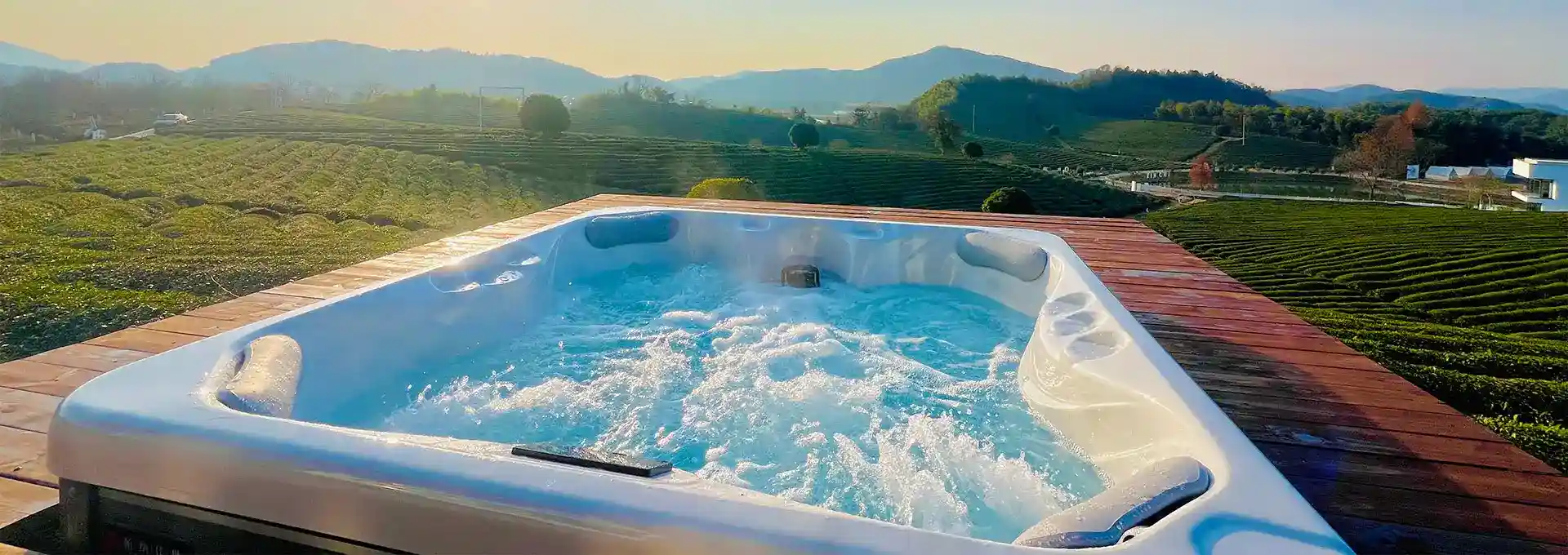Can a Swim Spa Be Salt Water?
2024-07-25 09:38:59
Swim spas have become increasingly popular for those seeking a versatile aquatic experience in a compact space. One question that often arises is whether swim spas can use salt water instead of traditional chlorine-based systems. The answer is yes, many swim spas can indeed be converted to or designed with salt water systems. This article will explore the benefits and considerations of salt water swim spas, with a focus on luxury 7-seater swim spa models.
What are the benefits of a salt water swim spa?
Salt water systems in swim spas offer numerous advantages that have made them a popular choice among spa enthusiasts. First and foremost, salt water provides a more natural and gentler swimming experience compared to traditional chlorine-based systems. The salt concentration in these spas is much lower than that of seawater, typically around 3,000 parts per million (ppm) compared to the ocean's 35,000 ppm. This means the water feels softer on the skin and eyes, reducing irritation and dryness often associated with chlorine.
Another significant benefit is the reduced maintenance required for salt water swim spas. The salt chlorinator system continuously generates chlorine from the dissolved salt, maintaining a consistent sanitizer level in the water. This process eliminates the need for frequent manual addition of chlorine, resulting in more stable water chemistry and less time spent on maintenance tasks.
Luxury 7-seater salt water swim spas are also more environmentally friendly. The reduced need for chemical additives means fewer harsh chemicals are introduced into the water and eventually released into the environment. Additionally, the salt used in these systems is a renewable resource, making it a more sustainable option in the long run.
For those with sensitive skin or allergies to chlorine, salt water swim spas provide a welcome alternative. The lower chlorine levels and natural salt content can be less irritating to the skin, eyes, and respiratory system, allowing for a more comfortable and enjoyable swimming experience.
Lastly, many users report that salt water feels more buoyant, providing a unique swimming sensation that can enhance the overall experience in the spa. This can be particularly beneficial for those using the swim spa for exercise or physical therapy, as the increased buoyancy can reduce strain on joints and muscles.
How does a luxury 7-seater salt water swim spa compare to traditional models?
When comparing a luxury 7-seater salt water swim spa to traditional chlorine models, several key differences emerge. The most noticeable distinction is the overall swimming experience. Salt water swim spas provide a more natural, ocean-like feel that many users find preferable to the strong chlorine smell and sensation associated with traditional models.
In terms of initial cost, salt water systems for luxury 7-seater swim spas may have a higher upfront investment. The salt chlorinator and associated equipment can add to the initial purchase price. However, this cost is often offset by reduced long-term expenses for chemicals and maintenance.
Maintenance requirements also differ between salt water and traditional swim spas. While salt water systems require less frequent attention, they do need occasional monitoring of salt levels and periodic cleaning of the salt cell. Traditional chlorine systems, on the other hand, require more frequent testing and manual addition of chemicals to maintain proper water balance.
Luxury 7-seater salt water swim spas often come with advanced features that enhance the overall experience. These may include sophisticated control systems for managing water chemistry, energy-efficient pumps and heaters, and high-end jet systems for both swimming and hydrotherapy. Many models also incorporate LED lighting, water features, and integrated sound systems to create a truly luxurious environment.
The longevity of equipment can vary between salt water and traditional systems. While salt water is generally gentler on the skin and swimwear, it can be more corrosive to certain materials over time. However, modern luxury swim spas are designed with corrosion-resistant materials and components to mitigate this issue.
Lastly, the therapeutic benefits of salt water swim spas are often highlighted as a significant advantage. The natural properties of salt water can help soothe sore muscles, improve circulation, and promote relaxation. When combined with the hydrotherapy jets found in luxury 7-seater models, this can create an unparalleled wellness experience.
What should you consider before installing a salt water system in your swim spa?
Before deciding to install a salt water system in your swim spa, there are several important factors to consider. First and foremost, it's crucial to determine whether your existing swim spa is compatible with a salt water conversion. Not all models are designed to accommodate salt water systems, and attempting to convert an incompatible spa could lead to damage and voided warranties.
If you're purchasing a new luxury 7-seater swim spa, many manufacturers offer salt water options as either standard features or upgrades. In this case, the spa will be specifically designed to work with a salt water system, eliminating compatibility concerns.
Cost is another significant consideration. While salt water systems can lead to long-term savings on chemicals and maintenance, the initial investment can be substantial. This includes not only the cost of the salt chlorinator and associated equipment but also any necessary modifications to the existing spa if you're converting an older model.
It's also important to consider the impact of salt water on the surrounding environment. If your swim spa overflows or needs to be drained, the salt water can potentially damage nearby plants or affect soil composition. Proper drainage and handling of salt water are essential to minimize environmental impact.
Maintenance requirements, while generally lower than traditional systems, are still an important factor to consider. Salt water swim spas require regular monitoring of salt levels, occasional cleaning of the salt cell, and periodic replacement of the cell (typically every 3-5 years). Understanding these maintenance needs and being prepared to perform them is crucial for the long-term health of your swim spa.
The climate in your area can also affect the performance of a salt water system. In colder regions, salt chlorinators may need to be winterized or operated differently during the cold months to prevent damage. Additionally, extremely hot climates may require more frequent monitoring of water chemistry due to increased evaporation rates.
Lastly, consider your personal preferences and those of your family members. While many people prefer the feel of salt water, others may still prefer the traditional chlorine system. It's worth experiencing both types of water before making a decision, especially when investing in a luxury 7-seater swim spa.
In conclusion, salt water swim spas, particularly luxury 7-seater models, offer a unique and enjoyable aquatic experience with numerous benefits. From reduced maintenance and chemical use to a more natural feel and potential therapeutic advantages, salt water systems have much to offer. However, it's essential to carefully consider factors such as compatibility, cost, environmental impact, and personal preferences before making the switch. By weighing these considerations and consulting with professionals, you can make an informed decision about whether a salt water swim spa is the right choice for your needs and lifestyle.
For more information on hot tub installations and to find out more about our products, please feel free to contact us at info@iparnassus.com.
References:
1. Swim University. "Salt Water Hot Tubs: Pros, Cons & Maintenance."
2. Bullfrog Spas. "Salt Water Hot Tubs: Everything You Need to Know."
3. SwimEx. "Salt Water vs Chlorine Swim Spas: Which is Better?"
4. AquaComfort Solutions. "The Benefits of Salt Water Swim Spas."
5. Hydropool. "Salt Water Hot Tubs: Pros and Cons."
6. Master Spas. "Salt Water Hot Tubs: Are They Worth It?"
7. Endless Pools. "Salt Systems for Swim Spas: What You Need to Know."
8. PDC Spas. "Salt Water vs. Traditional: Which is Right for Your Swim Spa?"
9. Caldera Spas. "Salt Water Hot Tub Systems: Pros and Cons."
10. Hot Spring Spas. "Salt Water Hot Tub Systems: Everything You Need to Know."



